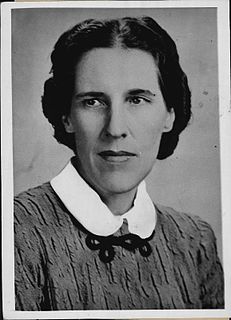A Quote by Catherine Drinker Bowen
People who carry a musical soul about them are, I think, more receptive than others. They smile more readily. One feels in them a pleasant propensity toward the lesser sins, a pleasing readiness also to admit the possibility that on occasion they may be in the wrong--they may be mistaken.
Related Quotes
may my heart always be open to little birds who are the secrets of living whatever they sing is better than to know and if men should not hear them men are old may my mind stroll about hungry and fearless and thirsty and supple and even if it's sunday may i be wrong for whenever men are right they are not young and may myself do nothing usefully and love yourself so more than truly there's never been quite such a fool who could fail pulling all the sky over him with one smile
Our understanding of the thought of the past is liable to be the more adequate, the less the historian is convinced of the superiority of his own point of view, or the more he is prepared to admit the possibility that he may have to learn something, not merely about the thinkers of the past, but from them.
There is great danger, yea many times most danger, in the smallest sins... Greater sins do sooner startle the soul, and awaken and rouse up the soul to repentance, than lesser sins do. Little sins often slide into the soul, and breed, and work secretly and undiscernibly in the soul, till they come to be so strong, as to trample upon the soul and to cut the throat of the soul.
When I'm in the process of making a movie I'm not thinking about the finished result, and whether people have to see it once or more than once, and what the reaction to it will be. I just make it, and then I live with the consequences, some of which may not be as pleasant as I'd like! I know one thing, however. Many viewers may come out of the theater not satisfied, but they won't be able to forget the movie. I know they'll be talking about it during their next dinner. I want them to be a little restless about my movies, and keep trying to find something in them.
I think there have to be Bachs and Beethovens. We may have - there are so many more people. Musical training is available to so many more, but it may be that we've hit a right wall in terms of accessible styles and since we demand innovation as a criterion of genius, there may not be more innovative styles to be found.
I may have come into politics with an unacknowledged condescension toward the game and the people who played it, but I left with more respect for politicians than when I went in. The worst of them - the careerists and predators - you find in all professions. The best of them were a credit to democracy.
Be proud of your mistakes. Well, proud may not be exactly the right word, but respect them, treasure them, be kind to them, learn from them. And, more than that, and more important than that, make them. Make mistakes. Make great mistakes, make wonderful mistakes, make glorious mistakes. Better to make a hundred mistakes than to stare at a blank piece of paper too scared to do anything wrong.
However we may flatter ourselves to the contrary, our friends think no higher of us than the world do. They see us through the jaundiced or distrustful eyes of others. They may know better, but their feelings are governed by popular prejudice. Nay, they are more shy of us (when under a cloud) than even strangers; for we involve them in a common disgrace, or compel them to embroil themselves in continual quarrels and disputes in our defense.
I think a good deal may be said to extenuate the fault of bad Poets. What we call a Genius, is hard to be distinguish'd by a man himself, from a strong inclination: and if his genius be ever so great, he can not at first discover it any other way, than by giving way to that prevalent propensity which renders him the more liable to be mistaken.






































